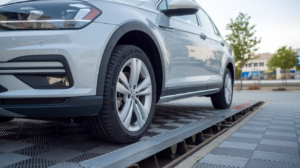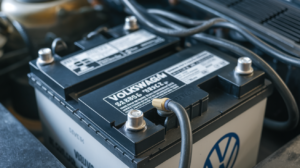
Best VW Battery Replacement Options for VW Models in 2025
Ever had your VW just refuse to start, like it had one job and went nope, not today? Yeah, we’ve seen it. It’s frustrating, especially when you’re running late, your coffee’s going cold, and the Dubai heat’s already melting your face off. That’s not just a bad day, it’s your car’s way of saying your battery’s calling it quits. If you’re stuck asking, “Okay, but what are the best VW battery replacement options for my 2025 model?” this blog’s got your back. We’re skipping the generic fluff and getting straight into real-world tips, honest comparisons, and battery picks that actually work for your car, your lifestyle, and your environment. What Changed in VW Battery Replacement Requirements in 2025? Why are VW batteries getting fussier in 2025? It’s not you, it’s the tech. Modern VWs are crammed with features, big screens, auto start-stop, adaptive lighting… all sipping power like it’s free coffee. That means one wrong battery and your whole system can start throwing tantrums. More electronics, more power drain VW cars in 2025 are loaded with sensors, infotainment systems, and stop-start engines. These features constantly draw current, even when the car’s off. Start-Stop tech demands specific batteries Most 2025 models now come with automatic start-stop. Standard lead-acid batteries just don’t cut it here, you need EFB or AGM to handle frequent restarts. Seeing random warning lights or “systems unavailable” messages? Skim 6 common Volkswagen problems and how to solve them to separate battery issues from bigger faults. Energy recovery systems are battery-sensitive VW’s newer energy recovery systems (like regenerative braking in hybrids) work best with batteries that can recharge quickly and repeatedly. Hybrid and electric models need high-spec chemistry VW’s e-Golf and ID.4 aren’t using your regular 12V. These cars demand lithium-ion or traction batteries with specific software interfaces. With so much evolving tech, the best VW battery replacement options are no longer just about fit and voltage. The battery that worked great in your 2018 model might straight-up confuse a 2025 Passat. That’s why choosing the right battery now means matching brains with brains, not just terminals to cables. Understanding VW Battery Replacement Types “ Which One Does Your Model Need? Staring at battery types like AGM, EFB, and Lithium and thinking… “Uhhh, what’s the difference?” Totally normal. Most people just want their VW to start without drama. But if you’re serious about finding the best VW battery replacement options, understanding these types upfront can save you money, time, and a whole lot of future headaches. EFB (Enhanced Flooded Battery) • Works well for basic start-stop VW models like the Polo or older Golfs • Budget-friendly and handles frequent engine restarts better than traditional lead-acid • Not ideal for tech-heavy VWs, lifespan drops fast in high-demand situations AGM (Absorbent Glass Mat) • The go-to for mid to high-spec VW models loaded with electronics • Handles deep discharges like a champ, charges quicker, and copes better in Dubai’s brutal heat • Costs a bit more than EFB but pays off in long-term reliabilit Lithium-Ion (for EVs and Hybrids) • Found in models like the ID.4, e-Golf, and plug-in Passat GTE • Lightweight, ultra-efficient, and designed for high-performance energy systems • Needs proper syncing with the BMS (Battery Management System) after installation to work correctly Choosing between these depends on your model, usage, and climate. That’s why understanding battery chemistry is key to picking the best VW battery replacement options for your 2025 vehicle. It’s not just about what fits under the hood, it’s about what actually performs for how you drive. Comparison Table | VW Models vs Recommended VW Battery Replacement Type Trying to figure out which battery works best for your specific VW model? You’re not alone. Whether it’s a Polo or an ID.4, every model has its own electrical appetite. If you’re hunting for the best VW battery replacement options, this quick-reference guide will save you from guesswork and costly mismatches. VW Model Year Recommended Battery Notes VW Polo 2022-25 EFB For basic auto start-stop VW Golf 8 2020-25 AGM Handles tech load better VW Passat GTE 2020-25 Lithium-Ion Plug-in hybrid, BMS needed VW Tiguan 2021-25 AGM Ideal for SUV energy load VW ID.4 2022-25 Lithium-Ion Full EV, software-coded So no, it’s not one-size-fits-all. Picking the right battery isn’t about price, it’s about function and compatibility. The wrong one might still “fit” physically, but it’ll burn out faster than you can say jump start. Always match your car’s needs with the best VW battery replacement options built for its design. Top Battery Brands for the Best VW Battery Replacement Options Picking a car battery isn’t much different from ordering food on an app, you want something that works, lasts, and doesn’t disappoint halfway through. And when it comes to the best VW battery replacement options, the brand you choose can make or break your experience, especially under Dubai’s no-mercy heat. We’ve seen which ones last and which ones leave VW owners stranded and fuming. Bosch Reliable, consistent, and built for German cars. Bosch AGM and EFB batteries work seamlessly with most VW models, and many come ready-to-code, saving setup hassle. Varta Practically made for Volkswagen Group cars. The Silver Dynamic AGM line especially stands out in Dubai’s heat. Long-lasting, quick starting, and tough as nails. Exide A solid mid-range brand. Exide’s EFB batteries are dependable, and their AGM line offers a balance between performance and affordability. Great for budget-conscious VW owners who still want reliability. Amaron (Popular in the Middle East) You’ll see this name a lot in the UAE. Amaron batteries do well in hot climates, but not all models are VW-optimized, so check compatibility before buying. AC Delco Not the top pick for newer VWs, but if you’re rocking an older Golf or Polo, it’s a fair budget-friendly choice that’ll get the job done without fuss. Brand matters more than people think. Just because it fits doesn’t mean it performs. To avoid dead batteries and dashboard chaos, stick with tried-and-tested names that offer the best



